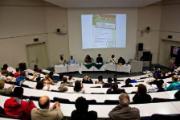
Questioning whether South Africans are aware of the challenges involved in translating the aims and objectives of the constitution into reality, Rhodes University’s Deputy Vice-Chancellor of Academic and Student Affairs, Dr Sizwe Mabizela challenged audience members with tough questions during a recent debate entitled “Is South Africa a home to all who live in it?”
“Why are we not honouring our commitments? Why don’t we treat people with respect and dignity? Our own humanity is inextricably intertwined with that of others. Until we see ourselves as part of humanity South Africa will never be a home to all,” said Dr Mabizela.
Xenophobia emerged as a strong theme throughout the debate, with panellists referring to the challenges posed by loosening border controls and increases in the number of migrants seeking new lives in South Africa.
Dr Joy Owen of Rhodes University’s Anthropology Department drew on her experience of working with Congolese migrants’ national, gender, religious and class expressions in an urban seaside town outside Cape Town. Calling for a more nuanced approach to the complex relational dynamics between South Africans and migrants, Dr Owen suggested that while xenophobic attitudes do exist, individuals are also finding unique and inspiring ways of negotiating their identities in new spaces.
“The most intimate of relationships exist in South Africa. There are stories of friendship and love across divides. On a micro level South Africans are forging relationships with continental Africans every day,” she said.
Highlighting the importance of bridging the multiple gaps which create social divides, Professor Pedro Tabensky, philosopher at Rhodes University suggested that an attempt to acknowledge humanity across divides could be helpful in trying to embody homeliness and overcome pervasive levels of violence in South Africa.
Prof Tabensky believes that violence is the result of the inability to relate to others and respect their humanity. A deepening of acceptance and love for humanity is the only remedy, he said.
Bishop Paul Verryn of the Central Methodist Church, Johannesburg, believes we are at an important juncture in the entire human enterprise. Having been instrumental in providing refuge to thousands of displaced foreigners since the May 2008 xenophobic attacks, Bishop Verryn believes that with the emergence of migration come challenges about how to identify ourselves “not so much as in our nation but as part of humanity”.
“The opening of our homes and borders to Zimbabweans does not come without difficulties. There isn’t any social difficulty with which we don’t deal on an everyday level,” said Bishop Paul Verryn, but suggested that the inherent challenges also have the potential for redemption.
“There is no doubt that opening the doors and borders releases the potential for addressing major issues that face the growth of this nation which is exponential. We are a nation that has inherent prejudice. I think that as we allow ourselves to deal more complexly with our prejudices we begin to unlock a potential in this nation that allows us to become more authentically African, and perhaps hold a torch for the healing of the world,” he added.
Drawing on the preamble to the South African Constitution of 1996 which reads: “We the people of South Africa, Recognise the injustices of the past; Honour those who suffered for justice and freedom in our land; Respect those who have worked to build and develop our country; and Believe that South Africa belongs to all who live in it, united in our diversity,” Professor Barney Pityana, well-known human rights activist and Rector of the College of Transfiguration outlined social cohesion as one of the commitments made in the constitution.
“The constitution is founded on certain values like human rights and social justice. South Africa as a home is an important theme and social cohesion is one of the central issues. South Africa’s social and economic development is influenced by how we relate to one another,” he added.
Rhodes academics, public intellectuals and struggle icons recently participated in the debate aimed at unearthing the deep seated beliefs and values surrounding identity politics in South Africa. The panellists approached the topic from various standpoints, touching on themes of xenophobia, national identity, spirituality and understandings of home.
By Sarah-Jane Bradfield
Photo by: Adrian Frost
